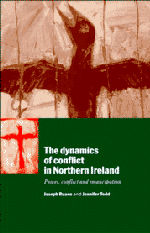Book contents
- Frontmatter
- Contents
- List of figures
- List of tables
- Preface
- 1 Introduction
- 2 Historical formations
- 3 The reconstruction of communal division
- 4 Ideology and conflict
- 5 The dynamics of conflict: politics
- 6 The dynamics of conflict: the economy
- 7 The dynamics of conflict: culture
- 8 The British context of the Northern Ireland conflict
- 9 The Republic of Ireland and the conflict in Northern Ireland
- 10 The international context
- 11 An emancipatory approach to the conflict
- Epilogue
- Appendix
- Bibliography
- Index of names
- Index of subjects
8 - The British context of the Northern Ireland conflict
Published online by Cambridge University Press: 18 December 2009
- Frontmatter
- Contents
- List of figures
- List of tables
- Preface
- 1 Introduction
- 2 Historical formations
- 3 The reconstruction of communal division
- 4 Ideology and conflict
- 5 The dynamics of conflict: politics
- 6 The dynamics of conflict: the economy
- 7 The dynamics of conflict: culture
- 8 The British context of the Northern Ireland conflict
- 9 The Republic of Ireland and the conflict in Northern Ireland
- 10 The international context
- 11 An emancipatory approach to the conflict
- Epilogue
- Appendix
- Bibliography
- Index of names
- Index of subjects
Summary
There are contrasting views of Britain's role in the Northern Ireland conflict. For some, the conflict has its roots in a peculiarly Irish or Northern Irish context and Britain offers a progressive modern political arena within which it can be resolved. For others, the conflict derives from the British presence and is prolonged by it. In this chapter we show how the dynamics of the British state and wider British world have impinged on the conflict and assess the opportunities they offer for a resolution of the conflict.
The British state and British world
The British world is that wider political and cultural realm, brought into being by the expansion of the English/British state, which over centuries has felt the impress of English/British decision-making, institutions and culture. It reached its greatest territorial extent and cohesion in the late nineteenth century when it embraced a quarter of the land surface of the globe. It now exists only in residual form. It was a distinctive political and cultural formation, one in which state- and empire-building went on simultaneously, and in which ethnic, national and imperial identities collided, coalesced and – in varying degrees and for differing lengths of time – fused.
The constitution
The British state developed less as a legal-rational structure than as a complex and uneven assemblage of structures, institutions and ritual practices. There has been no formal written constitution; statute law, made by and revokable by parliament, and established practice have defined the constitutional parameters. Nor has the constitution had clear territorial definition. In practice, two constitutional spheres developed within the British world – one for the domestic or metropolitan sphere, another for the imperial or colonial.
- Type
- Chapter
- Information
- The Dynamics of Conflict in Northern IrelandPower, Conflict and Emancipation, pp. 204 - 231Publisher: Cambridge University PressPrint publication year: 1996



